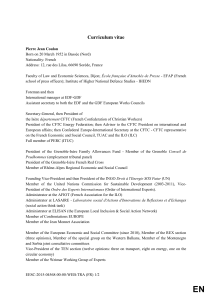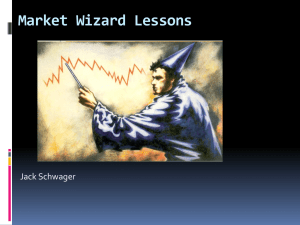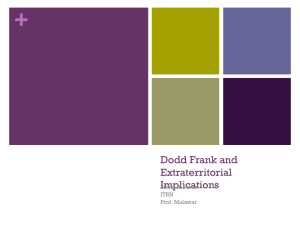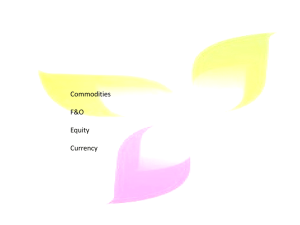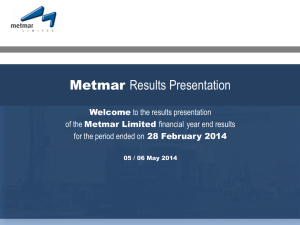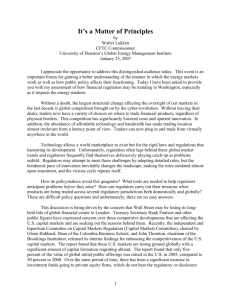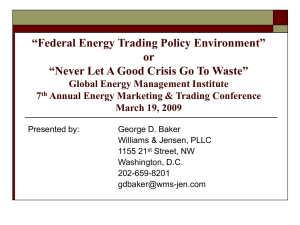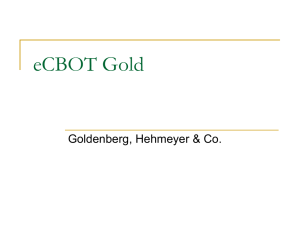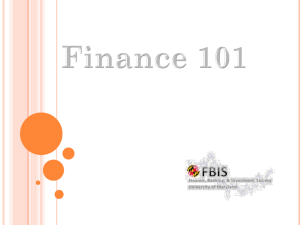Regulatory Focus on Market Structure and Trading Issues Janet M
advertisement
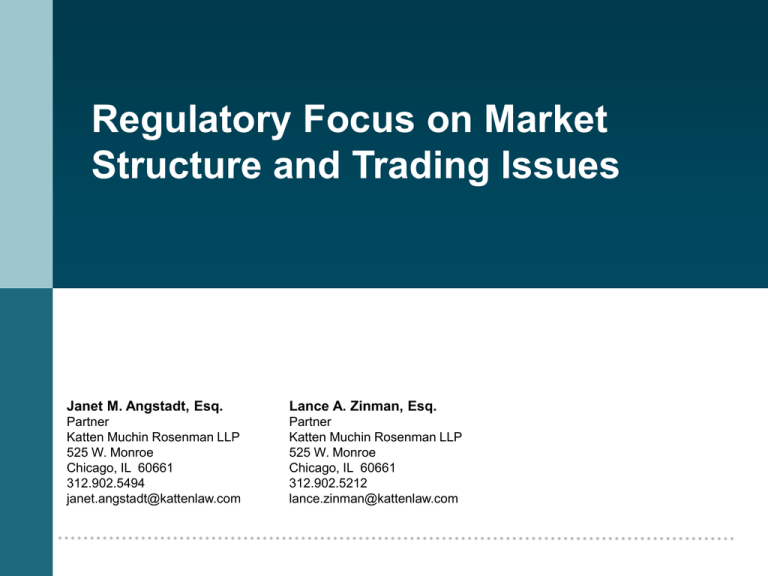
Regulatory Focus on Market Structure and Trading Issues Janet M. Angstadt, Esq. Lance A. Zinman, Esq. Partner Katten Muchin Rosenman LLP 525 W. Monroe Chicago, IL 60661 312.902.5494 janet.angstadt@kattenlaw.com Partner Katten Muchin Rosenman LLP 525 W. Monroe Chicago, IL 60661 312.902.5212 lance.zinman@kattenlaw.com Regulatory Focus on Market Structure and Trading Issues The SEC and CFTC have increased their focus on market structure and trading issues since the “Flash Crash.” Among the issues of focus are: Disruptive trading practices • Focus of enforcement from the SEC and CFTC • CFTC proposal concerning disruptive trading practices Controls for algorithms and automated trading strategies • Focus of regulatory inquiries and possible rulemaking from both the SEC and CFTC Market access controls • New SEC Rule 15c3-5 • Possible rulemaking from the CFTC Disruptive Trading Practices Focus of SEC Enforcement SEC Chairman Mary Schapiro has announced that SEC Enforcement staff is focusing on whether certain trading practices potentially give rise to federal securities law violations. Such practices include • layering or spoofing • improper order cancellation activities or "quote stuffing" • the use of order anticipation and momentum ignition strategies undertaken for a manipulative purpose • passive market making practices that incentivize possible manipulative quoting activity • abusive co-location and data latency arbitrage activity in potential violation of Regulation NMS • use of direct market access arrangements to conceal manipulative trading activity Securities: Spoofing, Layering and Quote Stuffing “Spoofing” is generally a reference to the practice of entering orders to drive the price of a security up (or down) without any intention of receiving an execution “Layering” is a form of spoofing where a participant enters multiple orders at different prices on one side (or both sides) of the market for the purpose of creating a false appearance of trading activity “Quote Stuffing” is often described as entering large number of orders and canceling those orders immediately for the purpose of slowing down quoting networks responsible for updating the NBBO Statements in electronic communications often are used by regulators to establish intent Trillium Settlement with FINRA Trillium Brokerage Services and several individuals settled with FINRA for a total of $2,300,000 in September 2010 FINRA found that the traders were using an improper trading strategy which used orders that were immediately cancelled to create a false appearance of trading activity Traders entered numerous layered, non-bona fide market moving orders to generate selling or buying interest in specific stocks The trading strategy induced other market participants to enter orders to execute against limit orders previously entered by the Trillium traders FINRA fined nine Trillium proprietary traders, the head trader and the head of compliance Trillium (Continued) FINRA alleged that traders at Trillium engaged in a “repeated pattern of layering conduct to take advantage of trading, including algorithmic trading by other firms” After entering a buy (sell) limit order into Nasdaq, a Trillium trader would repeatedly enter numerous layered, non-bona fide, market moving sell (buy) orders through Nasdaq on the opposite side of the market from the limit order at prices primarily outside of the Nasdaq BBO The trader would then buy (sell) shares at prices that were lower (higher) than he would otherwise have been able to buy (sell) shares but for his entry of the numerous non-bona fide sell (buy) orders into Nasdaq Within seconds of receiving the executions of the buy (sell) limit orders, the trader would cancel the non-bona fide orders in Nasdaq The trader would typically repeat this pattern on the opposite side of the market, beginning with the entry of a sell (buy) limit order for the same security, followed by the placement of numerous non-bona fide buy (sell) orders Trillium (Continued) Fines and Sanctions for the Firm • Fine of $1,000,000 • Disgorgement of $173,357 Fines and Sanctions for Individuals • Total of 11 individuals paid fines and/or disgorgement • Individual fines ranged from $220,000 to $12,000 • Disgorgement ranged from $78,000 to $7,000 • Suspensions for individuals ranged from two years to 6 months • Four individuals charged with failure to supervise Total: $2,300,000 Securities: Momentum Ignition Entering a series of orders and trades in an attempt to ignite a rapid price move either up or down Rapid submission and cancellation of many orders, along with the execution of some trades, will trigger the algorithms of other traders and cause them to buy (sell) more aggressively Alternatively, a trader may intend to trigger standing stop loss orders that would help cause a price decline Securities: Manipulation Marking the Close (Open) • Marking the close is a manipulative device whereby the manipulator tries to influence the closing price of a stock by executing purchase or sale orders at or near the close of the market Painting the Tape • Painting the tape signifies creating an appearance of trading activity without an actual beneficial ownership Wash Trade • A wash trade is a transaction made without an intent to take a genuine, bona fide position in the market, such as a simultaneous purchase and sale designed to negate each other so that there is no change in financial position Disruptive Trading In Futures Markets CFTC proposed an Interpretive Order issued on March 18, 2011 concerning definitions of disruptive and manipulative conduct in the futures market: • Violating Bids and Offers • Order Execution of Transaction During Closing Period • Spoofing Futures: Orderly Execution of Transactions During Closing Period CFTC proposed that violations will occur where a trader acted recklessly. This attempts to ensure that legitimate trading activity and individuals acting in good faith do not become violations “Closing period” proposed to mean “the period in the contract or trade when the daily settlement price is determined under the rules of that trading facility” Sample Disciplinary Matter - In the Matter of Moore Capital Management, LP, Moore Capital Advisors, LLC, and Moore Advisors, Ltd., CFTC Docket No. 10-09 (Apr. 29, 2010): $25 million civil monetary penalty, joint and several liability; all defendants attempted to manipulate the settlement prices of platinum and palladium futures contract on NYMEX by “banging the close” • Moore Capital Management, LP manager agreed to pay a $1 million civil penalty to settle charges that he attempted to manipulate prices of palladium and platinum futures contracts • Manager permanently barred from trading futures at the close Futures: Spoofing Under the proposed rules, “spoofing . . . includes, but is not limited to: i. Submitting or cancelling bids or offers to overload the quotation system of a registered entity; ii. Submitting or cancelling bids or offers to delay another person’s execution of trades; and iii. Submitting or cancelling multiple bids or offers to create an appearance of false market depth” Intent is required Sample Disciplinary Matter - In the Matter of Bunge Global Markets, Inc., CFTC Docket No. 11-10 (Mar. 22, 2011): $550,000 civil monetary penalty; Bunge entered orders to purchase or sell soybean futures contracts in preopening trading sessions on Globex that Bunge had no intention of having executed. The CFTC alleged that these orders caused prices to be reported that were not true and bona fide, and that the soybean futures orders also constituted false, misleading or knowingly inaccurate reports concerning soybean market information that affected or tended to affect the price of soybeans, in violation of the CEA Futures: Manipulation The Commodity Exchange Act as amended by Dodd-Frank expands the CFTC’s anti-manipulation enforcement powers CFTC is attempting to prohibit practices “that are intended to mislead investors by artificially affecting market activity” Intent is required Sample Disciplinary Matter - CFTC v. Energy Transfer Partners, LP, Case No. 3:07-cv-01301 (N.D. Tex. 2008): $10 million civil monetary penalty; Energy Transfer Partners, L.P., Energy Transfer Co., Houston Pipeline Co., and ETC Marketing, Ltd. attempted to manipulate the price of natural gas for delivery at the HSC by selling on the ICE massive quantities of natural gas at HSC to place downward pressure on natural gas prices at the HSC and reported those transactions in an attempt to manipulate the index price of natural gas at the HSC
